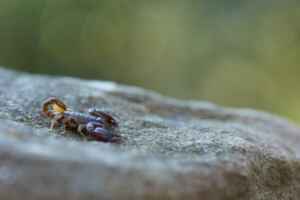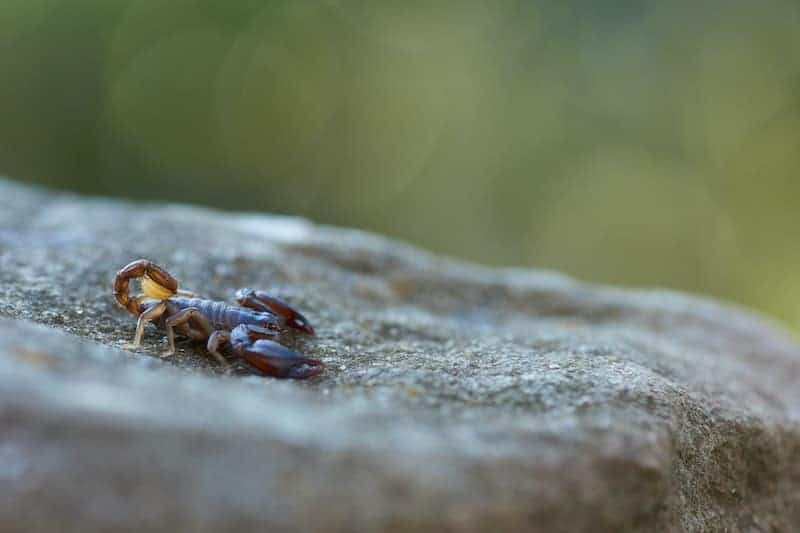How to Safely Kill Scorpions
If you live in a climate where scorpions are prevalent, then there is always the chance that they will find their way into your home. Scorpions can be dangerous to people and pets alike, so it’s important to know how to get rid of them before they cause any harm.
So, how do you kill scorpions? The most common way to kill scorpions is by using an insecticide spray. You can buy a ready-made, concentrated spray that will take care of the problem for you or make your own batch from ingredients like dish soap and water. You can also kill scorpions using sticky traps, diatomaceous earth, or even scare them away using a bright light.
If there is a possibility that you will find a scorpion in your home based on the area in which you live, it is wise to prepare yourself ahead of time. In this post, we will discuss why you should equip yourself to kill scorpions and the dangers they can pose to yourself and your family.
Best Methods for Killing Scorpions
Unlike most spiders and other creatures, scorpions are not only an unpleasant discovery but they can harm both humans and animals! There are, of course, multiple methods for killing scorpions.
Use an Insecticide Spray to Kill Scorpions
Perhaps the most common method used to kill scorpions is to use an insecticide spray. You can buy a ready-made, concentrated spray that is marketed especially for use on scorpions.
Alternatively, you can make your own insecticide for scorpions using simple ingredients like dish soap and water. Apply the insecticide all around where you found the scorpion as well as in places they could have gone if not killed on sight.
Use a Bright Light to Frighten Scorpions
While it doesn’t directly kill them, you can frighten scorpions using a bright light. If there are any cracks or holes in your walls, seal those up so they don’t find their way inside again! Scorpions may also be living under appliances; check these areas too when looking for more hiding spots after spraying them with repellent.
If you’ve found a scorpion in your house, it is important to act quickly and get them out of the way before they can do any harm! Keep this article bookmarked so that next time you have an encounter with one, you know what to do!
Use Diatomaceous Earth to Kill Scorpions
One of the easiest, but messiest methods for killing scorpions is by using diatomaceous earth. This natural material will irritate their skin and cause them to dry out from within until they die.
It can take a few days or weeks before you see any results, so this isn’t an instant kill like insecticide sprays or lights. When applied correctly, however, diatomaceous earth kills all types of insects on contact without leaving behind toxic residue.
Use Sticky Traps to Kill Scorpions
Another way to kill scorpions is by using sticky traps. These are simple, non-toxic ways that you can place around your home to catch more bugs and discourage them from coming back into the house.
What Are Scorpions?
 In some climates across the world, scorpions are a common pest and inhabit many homes. Scorpions are arachnids that have a segmented body, eight legs, and two claws. They also possess a pair of pincers which they use for capturing prey.
In some climates across the world, scorpions are a common pest and inhabit many homes. Scorpions are arachnids that have a segmented body, eight legs, and two claws. They also possess a pair of pincers which they use for capturing prey.
True scorpion species can be found in the United States, Mexico, Asia, and Africa.
Some species of scorpion have long slender tails and are only active at night. The Scorpionidae family has shorter, broader tails and tends to be more active during the day.
This difference in behavior can help you distinguish which type you’re dealing with!
Scorpions can be found in several different environments, but they are most common in dry regions where the ground provides plenty of hiding spots for them to live and breed. They’re often attracted by food sources such as crickets or other insects that gather near outdoor lights at night – so make sure you turn off your outdoor lights!
Some people have reported scorpion sightings on their property after moving into an older house (especially if there’s been lots of recent rain).
What Do Scorpions Eat?
Most scorpions will eat insects including crickets or flies as well as spiders when available. The larger types may even go after small lizards or frogs if given the opportunity!
Why Are Scorpions Dangerous?
Scorpions are dangerous creatures for both pets and people alike. Some species even pose a risk as carriers of diseases like rabies or Zika virus. Scorpion venom is toxic when injected through skin contact.
The danger posed by scorpions is not just their venomous sting but their ability to cause death from anaphylactic shock! People who suffer from allergic reactions (or asthma) should take extra care around scorpions.
However, most scorpion bites occur from unsuspecting hands picking up these creatures by their tails while cleaning under furniture or other items laying on the ground. It’s wise not to leave any food or drinks sitting out when not in use as the sugar may attract these creatures.
What Should You Do If You Find a Scorpion?
The general advice for finding a scorpion in your house is to kill it with an insecticide spray or by using another method as discussed above. Be sure that you also seal up any cracks and holes where they could enter!
When cleaning, be on the lookout for small dark objects such as shed exoskeletons which may indicate current or previous sightings of these dangerous creatures.
Protecting Yourself from Scorpions
The best way to avoid death from an encounter with a scorpion is prevention: wear gloves while cleaning up droppings and carefully dispose of them without touching the body (it takes about 24 hours before their poison is effective again).
You should always keep a close eye on your pets if they go outside, as scorpions love hiding under things like rocks, logs, or plants–or inside hard-to-reach places like pet houses!
If you notice that your dog has an encounter with a scorpion resulting in a sting there is the risk that it could develop severe illness symptoms; make sure to contact a vet immediately for treatment advice.
Best Ways to Prevent Scorpions
Of course, the best way to protect yourself against scorpions is to take preventative measures. Doing so will minimize the chances of having to kill a scorpion in your home or yard.
Eliminate Hiding Spots
The best way to deter scorpions is by removing hiding spots and other things they find attractive. This includes keeping food put away, removing any piles of junk or wood near your house (especially if it’s been sitting there for a while), sweeping up leaves regularly, and clearing out any spider webs in the corners of your home – these are favorite new homes for these creatures!
Create a Barrier Around Your Home
If you have plants around your property that seem to be bringing them in somehow, try spraying down anything nearby with insecticide. Also, consider using diatomaceous earth as an additional deterrent: this powder is made from tiny pieces of fossilized algae which can get into their exoskeletons and kill them on contact.
Turn Off Your Outdoor Lights
In the evenings, turning off your outdoor lights can help keep scorpions away. Crickets, spiders, and other smaller insects that are food for scorpions are attracted to lights. Turning off your lights will minimize the possibility of a scorpion feast outside your front door.
Keep Your Yard Clean
Maintaining a neat yard helps deter these creatures from coming into contact with you or your pets. Get rid of any piles of leaves on the ground (a quick sweep every few days should be enough) and do not leave trash sitting around.
Keep an eye out for other signs such as old exoskeletons which may indicate that there have been previous sightings nearby. Leave some soil uncovered if possible since this provides more places for their natural prey items to congregate – this makes it doubly hard for scorpions to find food.
Hire a Pest Control Professional
If you feel your scorpion problem is out of control, it is best to hire a pest control expert. A local company will come out and assess the extent of the problem before making recommendations about what can be done. This may include sealing cracks in walls (or spraying down dirt piles) with an insecticide spray that could keep them away from where they like to hide during the day such as under furniture or inside voids between buildings and houses.
Above all, try not to panic if you see one of these creatures – they are much less likely to sting when handled carefully and calmly!
Related Questions
How can you tell if a scorpion has been in your house or yard before?
Scorpions will leave behind droppings which are generally brown or black and look like dog poop. Additionally, they can also create your own little “homes” in a hidden place such as under logs or rocks–or inside things like pet houses (if you notice that one of these spots has stains on it but is otherwise clean, this could be an indication).
Lastly, if there’s been any construction going on near your house then keep an eye out for the creatures! When underground tunnels get disrupted by building work scorpions have to find new places to live and might show up nearby.
What are the symptoms of a scorpion sting?
If a scorpion has stung someone, it is important to watch out for severe illness symptoms. If you have been bitten by a scorpion and are experiencing any of the following symptoms:
- painful swelling or tingling in your mouth or on your skin around the sting site
- excessive sweating
- hives, nausea, vomiting, diarrhea – these could all be due to an allergic reaction which can lead to more serious health problems if not treated quickly
If you believe you’ve been stung by a scorpion, it’s important to get immediate medical attention.

